INTERVENE/PARTICIPATE
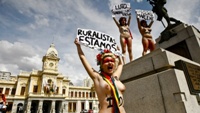
© Revista Época
How can individuals and groups intervene and participate in society, and what role does the body play in this respect? How is the state of the body’s agency, its capacity to effectively intervene in social conditions? These questions will be discussed based on a broad range of examples including the Arab Spring and in regard to social movements such as ‘Occupy’. The focus is on forms of emancipation from traumas and oppression in dance, acts of bodily self-empowerment and the choreographic treatment of political chaos and social crisis. Furthermore, the aesthetics of protest of social movements will be confronted with the political of choreographies in public space. And, perspectives of the body beyond the norm will be presented that address the subversive potential of differently abled bodies.
Fri, 7 June 12:00
-
12:15 - 13:00 Capitol, Club Video
Act of Empowerment
A Dialogue on the Bodies of Dance in Arab Cultures
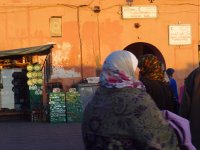 © Sandra Noeth
© Sandra NoethDancing bodies in Arab and especially in Islamic cultures are often read, named, described and represented on the backdrop of ‘patrimonial’, religious, mystical and ancestral heritage and traditions. However, it seems important to see the variety and richness of materials and unique entries that choreographers and dancers keep on developing in the very friction between and enriched by local and universal forms of expression.
More than ever, contemporary dance in the Arab region appears as a living art, which stimulates and incorporates change. Nedjma Hadj-Benchalabi and Sandra Noeth therefore grasp contemporary dance production as equally physical and discursive “act of empowerment” which are nourished and contaminated by a state of emergency with an inherent sense of (public) engagement and involvement. Dance seems to be for the artists and the public almost an attempt to formulate a response and to stay in dialogue with the complex demands and the deep transformations in the order of the world.Nedjma Hadj-Benchalabi (B) curator
Sandra Noeth (D) dance scholar, curator
Fri, 7 June 15:00
-
15:00 - 17:45 tanzhaus, Studio 5
dé-position
Research on the Body’s Agency
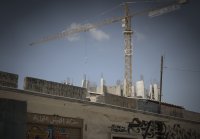 © Lejla Mehanovic
© Lejla MehanovicWe are living in times of far-reaching social and political upheavals, in which the question of the body’s agency is posed anew in regard to situations of protest, revolt and negotiation in the Arab region and elsewhere. In light of these events, the notion of choreography also goes beyond the creation and development of structures and the organisation of movement in time and space: How can chaos and collapse be treated choreographically? Can and should choreography do more than comment on, illustrate or represent processes of radical change? Based on their respective work practices and backgrounds in various disciplines, a group of artists and theorists addressed these questions in more detail during a research meeting in Beirut. Confronted with the challenge of having to perceive and at the same time understand different influences, narratives, contexts, and bodies in face of the current developments, they grasped choreography as a movement of continuous repositioning. Hence, the concept “dé-position” stands for giving up one’s own position, for a physical and discursive change in perspective as the precondition for understanding, evaluating and acting. In two afternoons, Congress participants are invited to share the questions, materials and practices of this research work.
Antonia Baehr (D) choreographer, performer
Claudia Bosse (A) choreographer, director
Tony Chakar (LB) architect, artist
Janez Janša (SLO) choreographer, director, performance theorist
Adrian Lahoud (UK) architect, architecture theorist
Lejla Mehanovic (A) film-, theatre scholar
Sandra Noeth (A) dance scholar, curator
Jalal Toufic (LB) philosopher, artist
Sat, 8 June 14:00
-
14:00 - 17:45 tanzhaus, Studio 5
dé-position
Research on the Body’s Agency
 © Lejla Mehanovic
© Lejla MehanovicWe are living in times of far-reaching social and political upheavals, in which the question of the body’s agency is posed anew in regard to situations of protest, revolt and negotiation in the Arab region and elsewhere. In light of these events, the notion of choreography also goes beyond the creation and development of structures and the organisation of movement in time and space: How can chaos and collapse be treated choreographically? Can and should choreography do more than comment on, illustrate or represent processes of radical change? Based on their respective work practices and backgrounds in various disciplines, a group of artists and theorists addressed these questions in more detail during a research meeting in Beirut. Confronted with the challenge of having to perceive and at the same time understand different influences, narratives, contexts, and bodies in face of the current developments, they grasped choreography as a movement of continuous repositioning. Hence, the concept “dé-position” stands for giving up one’s own position, for a physical and discursive change in perspective as the precondition for understanding, evaluating and acting. In two afternoons, Congress participants are invited to share the questions, materials and practices of this research work.
Antonia Baehr (D) choreographer, performer
Claudia Bosse (A) choreographer, director
Tony Chakar (LB) architect, artist
Janez Janša (SLO) choreographer, director, performance theorist
Adrian Lahoud (UK) architect, architecture theorist
Lejla Mehanovic (A) film-, theatre scholar
Sandra Noeth (A) dance scholar, curator
Jalal Toufic (LB) philosopher, artist
Sat, 8 June 16:00
-
16:00 - 16:45 Capitol, Club
Risk-taking Bodies and Their Choreographies of Protest
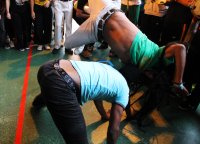 © Cristina Rosa
© Cristina RosaIn this lecture demonstration, Cristina Rosa examines the political potential of choreography in contemporary Brazil. She shows how people take bodily risks to lend their protest greater impact. From the Afro-Brazilian fight dance capoeira, to the violent dance technique called “physical perception” by Grupo Cena 11, which takes up voodoo culture’s states of trance, all the way to the threat of mass suicide by the indigenous population of the Guarani-Kaiowás in October 2012, Cristina Rosa describes choreography as radical action in a fight for human rights and land demarcation.
Cristina Rosa (BRA/USA) dancer, dance scholar
Sat, 8 June 17:00
-
17:00 - 17:45 Capitol, Club Video
Border Control
Framing the Atypical Body
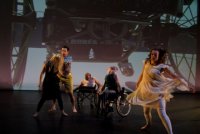 © Farrows Creative/Nt'l Theatre Wales
© Farrows Creative/Nt'l Theatre Wales“You say radical, I say conservative, you say inclusive, I say subversive …”
Since 2003, the playwright and dramaturge Kaite O’Reilly has been working intensively with deaf and disabled persons. In this lecture, she examines the possibilities and limits of artistic inclusion in performances, e.g., by Jérôme Bel and David Toole (among others, with the Candoco Dance Company, DV8), as well as her own work. To what extent is dealing with the “atypical body” politically and culturally shaped? How does the concept of normalcy of the majority society relate to a politicised “disability culture” that affirms the multiplicity of human differences?
Kaite O’Reilly (UK) playwright, dramaturge
Sun, 9 June 10:00
-
10:00 - 10:45 Capitol, Club Video
The Parallel Practice of Dance, Yoga and Urban Activism
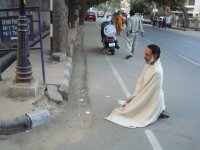 © Pavan Bisht
© Pavan BishtIndia’s self-understanding of dance is still characterised by classical dance and a self-flattering view to the past. In response to this, the Studio Abhyas founded by Navtej Johar in New Delhi combines yoga, dance and urban activism. These three at first glance totally independent body practices continuously enrich each other, thus assisting in developing a physical awareness of the present moment that puts us in a position to react to and have an impact on the complex urban reality of a megacity. Classical dance’s apolitical cult of the past is thus countered by a contemporary political form of art.
Navtej Johar (IND) choreographer
-
10:00 - 12:45 tanzhaus, Studio 6
Choreography, Protest, Public Sphere
 © Anja Kühn
© Anja KühnCan protest be choreographed? Can choreography be used to protest? The lab addresses the relationship between aesthetics and politics. It examines both the role of choreography in contemporary urban democracy movements and the political dimensions of artistic performances in public space: Under which conditions is an urban space transformed into a political public sphere by the means of choreography? This and other questions will be discussed based on current examples and with the aid of artistic-scientific procedures.
Gabriele Klein (D) dance scholar, sociologist
Oliver Marchart (D) sociologist
Martin Nachbar (D) choreographer
Vassilis Tsianos (D) sociologist, co-founder Kanak Attak
Margarita Tsomou (D) scholar, co-editor Missy Magazine